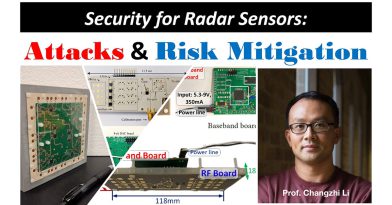
-
Tuesday, February 08, 2022 12:00 pm - 1:00 pm(New York Time) Add to my calendar
Security for Radar Sensors: Attacks and Risk Mitigation
Prof. Changzhi Li
Texas Tech University, USA
Abstract: By sensing various physical parameters with microwave signals, modern radar sensors with state-of-the-art front-end and AI-powered algorithms have great potential to improve transportation, healthcare, security, and human-machine interface. This presentation will first provide a quick overview on state-of-the-art smart radar sensors enabled by advanced digital/RF beamforming, multiple-input and multiple-output (MIMO), synthetic aperture radar (SAR), and deep learning. A few examples of interferometry, Doppler, frequency-shift keying (FSK), and frequency-modulated continuous-wave (FMCW) radar sensors operating at 5.8 GHz, 24 GHz and 120 GHz will be demonstrated. Then, the presentation will focus on the emerging security and resilience aspects of modern radar sensors as they become ubiquitous in many sectors of modern life. To this end, possible ways of malicious attacks based on spoofing and jamming to radar sensors will be demonstrated. The presentation will illustrate both analog and digital spoofing techniques in time- and frequency- domains, which not only fake target locations but also synthesize physical and physiological motions. To mitigate potential attacks and reduce security risks, new microwave and system technologies, such as inter-chirp modulation and hybrid waveform, will be unveiled. These efforts aim to make smart radar sensors more secure and trustworthy for their deployment in various areas. Finally, the talk will discuss future industrial, government and academic R&D outlook for the security of modern radar sensors and open the floor for interactive discussions with the audience.
Speaker’s Bio: Changzhi Li received the Ph.D. degree in electrical engineering from the University of Florida, Gainesville, FL, in 2009. He is a Professor at Texas Tech University. His research interest is microwave/millimeter-wave sensing for healthcare, security, and human-machine interface.
Dr. Li is a speaker of the MTT-S Speakers Bureau Program. He was a recipient of the IEEE Microwave Theory and Techniques Society (MTT-S) Outstanding Young Engineer Award, the IEEE Sensors Council Early Career Technical Achievement Award, the ASEE Frederick Emmons Terman Award, the IEEE-HKN Outstanding Young Professional Award, and the U.S. National Science Foundation (NSF) Faculty Early CAREER Award. He is an Associate Editor of the IEEE TRANSACTIONS ON MICROWAVE THEORY AND TECHNIQUES and the IEEE JOURNAL OF ELECTROMAGNETICS, RF AND MICROWAVES IN MEDICINE AND BIOLOGY. He is the TPC chair of the 2022 IEEE Radio & Wireless Week. He served as the chair of the MTT-S Technical Committee “Biological Effect and Medical Applications of RF and Microwave” from 2018 to 2019, a TPC Co-Chair for the IEEE MTT-S International Microwave Biomedical Conference from 2018 to 2019, and the IEEE Wireless and Microwave Technology Conference from 2012 to 2013.